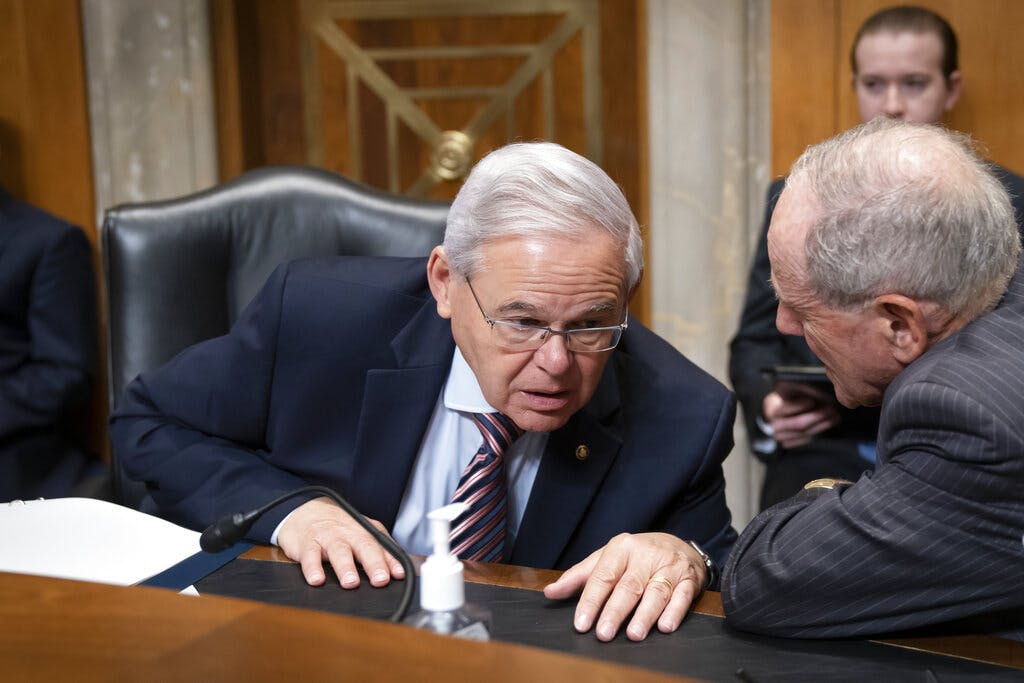As State Department, Courts Add Pressure, Can Biden Lure Tehran Back to a Nuclear Deal?
‘A return to the 2015 nuclear deal is not around the corner, and I believe it is not in America’s strategic interests,’ Senator Menendez said.

As the Biden administration attempts to lure Iran back to its nuclear agreement by levying tougher sanctions, it faces pressure in Congress, where a large, bipartisan group of senators opposes the deal.
During a Senate Foreign Relations Committee hearing on the Iranian Joint Comprehensive Plan of Action, the highest-ranking member of the committee, Senator Menendez, did not mince words on President Biden’s attempt to renegotiate the 2015 deal.
“I think we must prepare for the increasingly obvious reality we face in 2022 — a return to the 2015 nuclear deal is not around the corner, and I believe it is not in America’s strategic interests,” Mr. Menendez said.
The special envoy to Iran, Robert Malley, did not offer a positive outlook for the current state of the JCPOA, either, saying, “We do not have a deal … and prospects for reaching one are, at best, tenuous.”
If a deal is reached, Mr. Malley said, Congress would be able to “review” it. As in the 2015 deal, he avoided saying a new deal would become a binding, Senate-ratified treaty between Iran and America.
During the hearing, Mr. Malley announced that the State Department was enforcing new sanctions against the Islamic Revolutionary Guard Corps, an American-designated terror group. “As we have throughout the negotiations, we will strongly push back,” he said.
The JCPOA, which was negotiated by the Obama administration and signed in 2015, was supposed to extend the amount of time it would take Iran to develop nuclear weapons. Since the Trump administration pulled out of the agreement in 2018, Iran has been unfettered in proceeding with the enrichment of uranium.
As the Foundation for the Defense of Democracies’ chief executive, Mark Dubowitz, testified, however, most of Iran’s recent breakthrough nuclear advances were made after Mr. Biden’s election. On the campaign trail, Mr. Biden made clear his intention to re-engage diplomatically with the Islamic Republic and to renew the 2015 deal.
The International Atomic Energy Agency told members last week that Iran has doubled its Uranium stockpile since last November, adding that “Iran has amassed about 90 pounds of uranium enriched to 60 percent purity, a short, technical step away from weapons-grade levels.”
“Over the last four decades, no government in the world — including China or Russia — has had a more clear or consistent grand strategy to challenge the American-led world order than the Islamic Republic of Iran,” the chief Iran analyst of the Carnegie Endowment, Karim Sadjadpour, said during his opening remarks.
The Wall Street Journal reported today that between 2004 and 2006 Iran managed to obtain secret IAEA documents and evade inspection based on its knowledge of the agency’s strategy. In its current periodic reports, the IAEA routinely describes various ways in which Iran evades inspections.
While Iran has been sanctioned since America pulled out of the deal in 2018, the terror-sponsoring state has been able to avoid sanctions from other nations. According to Arab News, “Oil originating from Iran and Venezuela jumped 84 percent on-year to 2.165 million tons, the second-highest on record.”
Yet, as Iran’s oil sells at discounted rates and as its economy is ill-managed by the regime, Iranians are suffering economic hardships. In recent months the country has seen some of the widest protests since the Islamic Republic’s inception.
While Messrs. Menendez and Malley engaged in back-and-forth discussions about the future of the JCPOA, Mr. Sadjadpour delivered testimony as to the current state of Iran and American relations and offered ideas on how best America could proceed.
Mr. Sadjadpour said he believes that America can do more with sanctions to bring Iran closer to a deal, “Sanctions against Iran remain significant, but they have not been diligently enforced; Iranian oil sales to China have increased several-fold.”
Saying that the Trump administration had already attempted maximum pressure, Mr. Sadjapour said that the best place to start with Iran was still the JCPOA: “To be clear, there exists no good alternative to contain and reverse Iran’s nuclear progress other than a negotiated settlement.”
Meanwhile, the federal district court for the District of Columbia handed down a judgment requiring Iran to pay in excess of $325 million to the families of service members slain in the 1983 Beirut bombing, which killed 220 Marines in their barracks.
“The defendant must be punished to the fullest extent legally possible for the bombing in Beirut on October 23, 1983,” Judge Lamberth stated in his ruling.
While it is unclear if the Iranian regime will pay the judgment, it is a symbolic win for the victims’ families.
As the Biden administration seeks to add more sanctions to increase pressure on the Iranian regime, Mr. Sadjadpour summed up best how the Iranian leadership is feeling: “I think the current calculations of the Iranian leaders is that America is committed to reviving the JCPOA.”
The problem with that, he added, is that the Iranians “feel they can get the JCPOA whenever they want to. And simply now they are trying to extract as many concessions as possible.”

